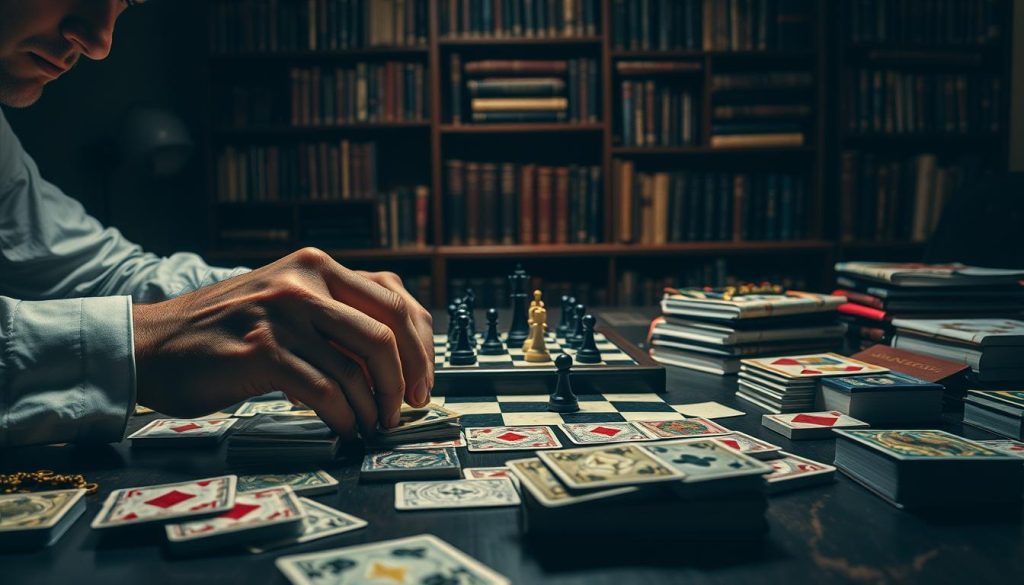Card games are exciting because they mix strategy and chance. Players in the United States love the challenge of skill vs luck. It’s a thrilling experience that tests your mind and intuition.
Every card game has a special mix of decisions and surprises. Games like Poker, Bridge, and Blackjack show how strategy can change the game. But, luck always plays a part too.
To win, you need to understand psychology, math, and strategy. It’s not about controlling everything. It’s about being smart when things go wrong.
If you love playing cards, learning about skill and luck is a great adventure. Our guide will show you how to master card games.
The Fascinating World of Card Games: A Perfect Blend of Chance and Strategy
Card games are a world where skill and luck meet. Players face challenges that test their brains and luck. The mix of strategy and chance keeps the game exciting.
Different card games offer unique experiences. They balance chance and strategy in their own ways. Games like poker and bridge challenge players to:
- Analyze potential moves
- Read opponent behaviors
- Calculate risk and reward
- Adapt quickly to changing scenarios
Chance in card games makes the game thrilling. Even the best players face surprises from random cards. This mix of strategy and surprise is fun.
Playing card games also brings people together. They can be played with friends or in tournaments. These games improve communication and strategic thinking. They are enjoyed by people of all ages and backgrounds.
Understanding Skill vs Luck in Card Games
Card games are a mix of skill and luck. They need both strategy and quick thinking. Players use math and psychology to win.

Winning at card games is not just luck. It’s about understanding the game well. You need to think deeply and plan ahead.
The Psychology Behind Decision Making
Decision making in card games is complex. It involves:
- Keeping calm under pressure
- Knowing when to take risks
- Spotting patterns
- Reading what others do
Probability Assessment in Card Games
Good players use probability to their advantage. They figure out the odds to make smart moves.
- Look at how cards are dealt
- Think about possible hand combinations
- Guess how likely success is
- Change plans as needed
Strategic Thinking vs Random Outcomes
Even with luck, smart thinking can lead to better results. Players who plan well can turn luck into skill.
To master card games, you must keep learning. Practice and understanding the game are key.
Popular Card Games That Balance Luck and Skill
Card games are a world where luck and strategy meet. Some games mix random chance and player skill in a fun and challenging way.
Poker is a great example of skill in card games. Players need to use their mind to win. They must think about psychology, math, and strategy. This shows that skill beats luck in poker.
- Poker: Requires reading opponents and calculating probabilities
- Bridge: Demands complex communication and strategic planning
- Blackjack: Involves mathematical decision-making and risk assessment
Bridge is another game that shows skill. Players must talk well with their partners and guess what the opponents will do. It’s all about making smart choices under pressure.
Blackjack is a mix of math and luck. Players use special tricks and math to beat the house. Knowing the game well can really help a player win more.
Games like poker, bridge, and blackjack teach that skill comes from practice and smart thinking. By learning the game well, players can get better and win more.
Mastering Card Game Strategies: Beyond the Luck Factor
Professional card players know success is not just luck. They use deep analysis, insight into psychology, and strategic thinking. To improve, players must turn luck into precise strategy.

Winning consistently is more than knowing the rules. Card game strategies involve complex decision-making and understanding opponents’ minds.
Reading Opponents’ Behaviors
Reading opponents well is key in card games. Players can get ahead by noticing small behavioral signs:
- Identifying physical tells and micro-expressions
- Recognizing betting pattern changes
- Understanding emotional responses during gameplay
- Detecting potential bluffing signals
Card Counting Fundamentals
Card counting is a complex way to predict game outcomes. It’s a method that helps players make better choices by tracking card distributions.
- Track high and low-value cards
- Calculate remaining deck composition
- Adjust betting strategies accordingly
- Maintain mental composure
Position and Timing in Play
Knowing when to act or fold is crucial. Experienced players use their position to gain advantages and reduce risks.
The Role of Mathematics in Card Gaming Success
Card game probability is key to becoming a strategic player. It’s more than just numbers. It helps players make better choices and improve their game.
Professional players use math to get ahead. They focus on important stats like:
- Expected value calculation
- Probability assessment
- Risk management techniques
- Statistical pattern recognition
Knowing probabilities helps players make better choices. For example, they can guess what cards will come next. This turns random events into something predictable.
Players get better at math by practicing. They learn to:
- Analyze game statistics
- Recognize probability patterns
- Make data-driven decisions
- Minimize potential losses
Using math in card games can really boost performance. It helps players go beyond luck and think more strategically.
Professional Card Players: How They Minimize Luck’s Impact
Professional card players know success is more than luck. They use smart strategies to beat luck and win big in tournaments.

Top players spend a lot of time getting ready for big games. They mix different skills to make a strong game plan.
Tournament Preparation Techniques
Good prep for tournaments includes a few key steps:
- Studying opponents and their games
- Creating detailed game plans
- Practicing regularly
- Simulating game scenarios
Bankroll Management Strategies
Managing money well is key for pros. They use:
- Setting clear money limits
- Having a special fund for tournaments
- Assessing risks carefully
- Keeping some money aside for emergencies
Mental Conditioning Methods
Players also focus on their mental game. They use special methods to stay sharp under pressure.
- Meditation and focus exercises
- Stress and emotion control
- Visualizing and rehearsing games
By using these methods, pros turn luck into strategy and win big.
Common Misconceptions About Luck in Card Games
Many players think card games are all about luck. They believe luck is either random or can be predicted. These ideas stop players from getting better at the game.
Some common myths include:
- The Gambler’s Fallacy: Believing past results affect future games
- Thinking some players are naturally luckier
- Believing short-term wins show long-term skill
But, pros know luck is part of the game. Skill is what leads to success over time. It’s about understanding how chance and strategy mix together.
Players often get caught in traps that make luck seem more important. They might get too excited about wins or upset by losses. This can lead to bad choices and unrealistic hopes for the game.
To beat these myths, players should:
- Learn about probability and game rules
- Think strategically all the time
- Watch how their game improves over time
- Get tips from experienced players
By seeing luck for what it is, players can improve their game. They should focus on getting better and not just on winning or losing.
Developing Your Card Game Skills: Expert Tips and Techniques
Mastering card games takes dedication, strategic thinking, and practice. Whether you’re new or getting better, improving your skills is a journey. It’s all about learning and getting better.
Good players know it’s not just luck. They prepare and practice to get better. This can really boost your game.
Practice Routines for Improvement
To get better at card games, focus on good practice:
- Analyze your gameplay through recorded sessions
- Study professional player strategies
- Practice making decisions quickly
- Work on your mental math and probability skills
Online Resources and Training Tools
Today, there are great tools for improving your card game skills. Digital platforms let you practice without losing money.
- Interactive tutorial websites
- Mobile game apps
- Simulation software for strategy practice
- Online forums with expert talks
Common Mistakes to Avoid
New players often make big mistakes. Knowing and fixing these can help you get better faster.
- Thinking luck is too important
- Letting emotions control you
- Ignoring the odds
- Not watching how opponents play
With the right tools and practice, you can turn chance into strategy.
The Evolution of Card Games: From Pure Chance to Strategic Complexity
The history of card games is really interesting. It shows how games changed from simple luck games to complex strategies. Early games were mostly based on luck, with little control for players. These games came from different cultures, used for fun and socializing.
Several things helped card games evolve:
- Cultural exchanges between different regions
- Technological advancements in game design
- Player demand for more complex gameplay
- Competitive gaming environments
Game designers wanted to make games more skill-based. So, they added complex mechanics. Games like poker and bridge became more strategic, rewarding players who knew how to make smart choices.
Today, card games mix complex rules with math, testing players’ thinking. Digital games have made it easier to create and play these complex games. This has led to more global competitions.
Card games have changed a lot, moving from luck to strategy. Designers now aim to mix luck with player control. This keeps games exciting and challenging for everyone.
How Technology Has Changed the Skill-Luck Dynamic in Card Games
Digital platforms have changed online card games a lot. They’ve made playing card games different. Now, players can use their skills more than luck.
Online card games have brought new tech to the table. This tech changes how we play:
- Advanced random number generation algorithms ensuring fair play
- Real-time game analysis using artificial intelligence
- Sophisticated tracking systems for player performance
- Instant matchmaking with skill-based ranking systems
Artificial intelligence is big in card games now. It helps players see their good and bad points. This way, pros can get better and not just rely on luck.
Mobile apps and online sites have made learning card games easy. You can practice and join tournaments from anywhere. This tech makes it fairer, where skill wins more often.
Now, players can check their games and get better. Digital places let you see your mistakes and grow. It’s a chance to get better at online card games.
Building a Winning Mindset: The Mental Game in Cards
Card game psychology is key to becoming a top player. It’s not just about knowing the game. Emotional control and resilience are crucial.
Starting a winning mindset means handling game challenges well. Players must keep their emotions in check. This helps them make smart choices, even when luck is not on their side.
Getting ready mentally involves setting routines for focus and calm. Techniques like visualization and meditation help players perform at their best. This way, they stay sharp and focused, even in tough games.
The mental game in cards is about getting better and adapting. Players who work on their mental game do better than those who only focus on skills. Understanding and improving your mental game can turn weaknesses into strengths.

